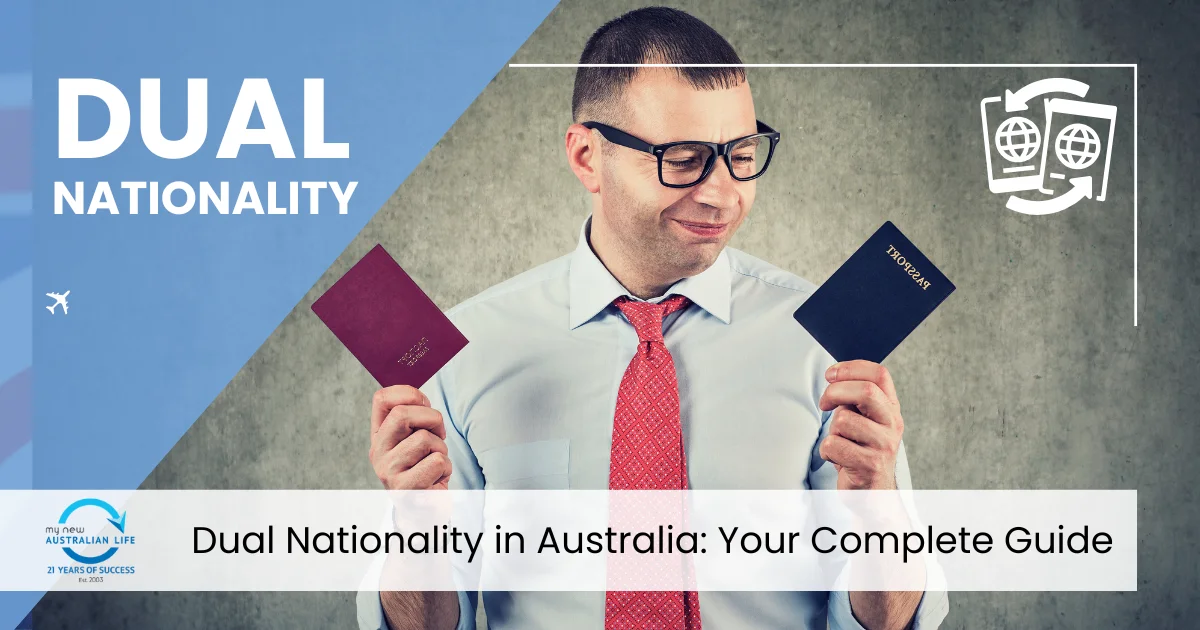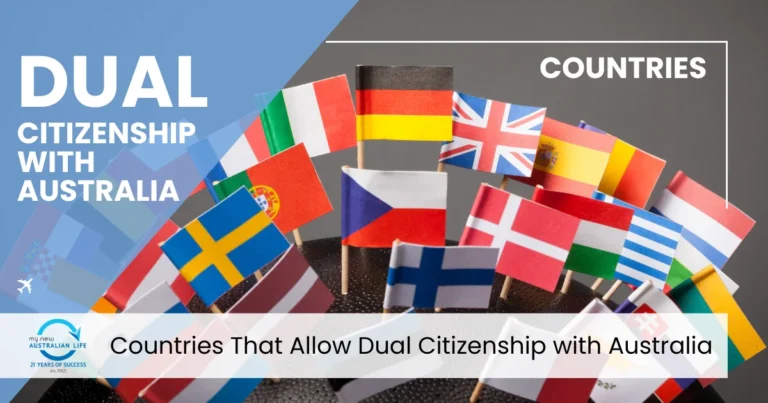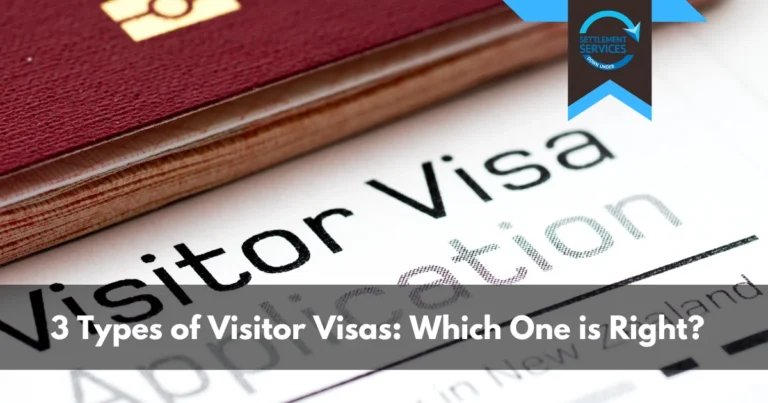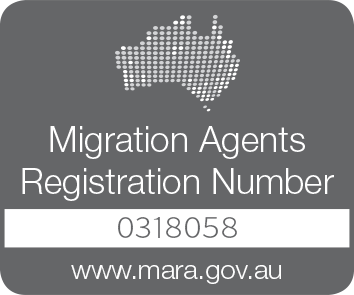Dual nationality, also referred to as dual citizenship, is the legal status of being a citizen of two countries simultaneously. This status allows individuals to enjoy the rights and responsibilities of both nations, including access to healthcare, education, and legal protections.
In an increasingly globalised world, dual nationality is becoming more common — especially in multicultural nations like Australia. If you’re considering making Australia your second home or retaining ties to your birth country, understanding the rules of dual citizenship is vital. Need expert support on your citizenship journey? Visit mynewaustralianlife.com for personalised guidance.
What is Dual Nationality?
Dual nationality occurs when a person holds legal citizenship in two different countries at the same time. This status is recognised under international law but regulated differently by each country.
While some countries fully allow dual nationality, others restrict or prohibit it entirely. For Australians, this legal status means you can be a full citizen of Australia while maintaining another citizenship, such as British or Canadian.
Does Australia Allow Dual Citizenship?
Yes, Australia allows dual citizenship. Since changes to the Australian Citizenship Act 2007, Australian citizens are permitted to hold the nationality of another country without losing their Australian status.
Historically, prior to 4 April 2002, Australians who acquired a second citizenship could lose their Australian nationality automatically. Today, Australians can apply for another country’s citizenship without any automatic loss of their Australian rights.
How to Apply for Australian Citizenship (Dual Nationality Path)
If you want to become a dual citizen of Australia, you need to first acquire Australian citizenship through naturalisation — assuming you are not already a citizen by birth or descent. Below are the key steps:
Step-by-Step Guide: Applying for Australian Citizenship by Conferral
Step 1: Check Your Eligibility
You must meet the following:
- Be a permanent resident of Australia
- Have lived in Australia for 4 years (1 year as a permanent resident)
- Be of good character (criminal background checks)
- Pass a citizenship test (unless exempt)
Step 2: Prepare Your Documents
You’ll need:
- Identity documents (passport, birth certificate)
- Proof of permanent residency
- Travel records
- Police clearances (Australian and overseas)
Step 3: Submit an Online Application
Go to the Department of Home Affairs website and create an ImmiAccount to submit your application online.
Step 4: Attend a Citizenship Appointment
You’ll be asked to attend an interview and take the Australian Citizenship Test if applicable. It covers Australian history, government, laws, and values.
Step 5: Wait for Approval
Processing can take several months. You will receive written notification if your application is approved.
Step 6: Attend the Citizenship Ceremony
Once approved, you’ll be invited to a local council citizenship ceremony where you must make the Pledge of Commitment. Only after this are you officially an Australian citizen.
Step 7: Retain or Reapply for Your Original Citizenship
- Check if your home country allows dual citizenship.
- Some may require you to notify or reapply for retention of citizenship.
- Others may revoke your original citizenship upon naturalisation elsewhere.
Need help with your citizenship paperwork or visa transition? Let the experts at mynewaustralianlife.com walk you through it step by step.
How to Become a Dual Citizen in Australia
There are three main ways to become a dual citizen in Australia: by birth, descent, or naturalisation. If you’re born in Australia to parents who are citizens of another country, you may qualify for dual nationality automatically.
Those born overseas to at least one Australian citizen parent may also acquire citizenship by descent. Meanwhile, migrants who acquire Australian citizenship via naturalisation can often retain their original nationality if their country permits it.
Countries That Allow Dual Citizenship with Australia
Below is a helpful table summarising the dual citizenship status of several major countries with respect to Australia:
Dual Citizenship Countries Overview
| Country | Allows Dual Citizenship | Notes |
|---|---|---|
| United Kingdom | Yes | No restrictions |
| United States | Yes | Permits dual citizenship |
| India | No* | Only minors; must choose one at 18 |
| China | No | Does not recognise dual nationality |
| Philippines | Yes* | Yes, under certain conditions |
| Germany | Yes* | Yes, since 2007 for EU and Swiss nationals |
| South Africa | Yes | Permits dual nationality |
| Canada | Yes | No restrictions |
| Japan | No* | Only under specific conditions |
| Indonesia | No | Generally does not allow |
*Note: Countries like India, Japan, and Indonesia may allow minors to temporarily hold dual nationality, but typically require a decision by adulthood.
To illustrate this further, here’s a breakdown of countries that allow vs. do not allow dual citizenship with Australia:
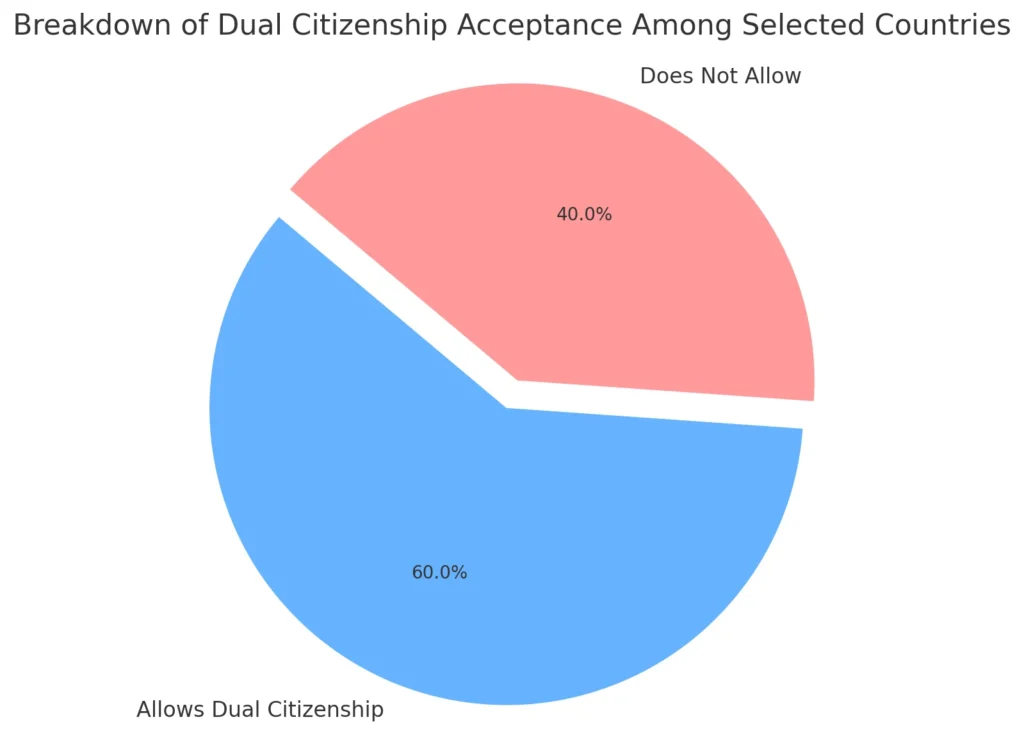
As seen above, a majority of the most popular migrant source countries for Australia allow dual citizenship, though some restrict or ban it entirely.
Benefits of Dual Nationality in Australia
Holding dual nationality comes with multiple advantages. Firstly, you can live, work, and study in both countries without needing visas or residency permits — a huge benefit for frequent travellers or global professionals.
Secondly, you gain access to public services like healthcare, education, and social welfare in both nations. For families, dual citizenship also offers children a greater choice in future study or career opportunities.
Responsibilities of Dual Citizens in Australia
While dual citizens enjoy many rights, they must also respect the obligations of both countries. For example, you may be required to pay taxes or complete military service depending on the laws of your other country.
Additionally, dual citizens must travel with the correct passport when entering and leaving Australia. Australian law requires citizens — including dual nationals — to enter and depart Australia using an Australian passport.
Challenges and Risks of Dual Nationality
Despite its advantages, dual nationality can present complications. If you get into legal trouble in your other country, Australian consular officials may be limited in the assistance they can provide.
Some countries also have laws that clash with Australia’s, including restrictions on dual ownership of property, business, or military service. It’s important to understand both nations’ legal requirements to avoid complications.
Dual Nationality and Australian Immigration
Many visa holders wonder whether dual citizenship is possible after gaining permanent residency in Australia. The answer is yes — once you meet the residency requirements, you can apply for Australian citizenship and keep your original nationality if allowed.
If you’re on a Skilled Independent, Partner, or Family Visa, gaining citizenship in Australia will not automatically cancel your existing nationality — unless your home country does not permit dual status.
FAQs on Dual Nationality in Australia
Can children hold dual nationality in Australia?
Yes. Children can hold dual citizenship if they’re born in Australia or to parents from different countries, as long as both nations permit it.
Do I lose my home country’s citizenship when I become Australian?
Not necessarily. It depends on your home country’s laws. Countries like the UK and Canada allow dual citizenship; others like India or Japan may not.
Can I renounce one of my citizenships later?
Yes. You can voluntarily give up one of your citizenships by applying to the relevant authorities, depending on your personal or legal preferences.
Expert Tips for Managing Dual Nationality
Always keep both passports valid and updated, especially when travelling internationally. It’s wise to carry both documents to navigate immigration controls efficiently.
Keep digital and physical copies of your legal documents, and notify both governments of any major changes such as marriage, address, or new children. Dual citizens must stay informed about laws in both countries to avoid unintentional breaches.
Is Dual Nationality Right for You?
Choosing dual citizenship is a major decision with personal, legal, and emotional implications. Consider your long-term goals: where do you see yourself living, working, or retiring?
For many migrants, the benefits of dual nationality — freedom, flexibility, and family connections — outweigh the potential drawbacks. But it’s vital to consult migration experts to understand how the law affects you.
Get Help with Your Citizenship Journey
Dual nationality can be a powerful asset in your life journey — but only if you manage it wisely. Whether you’re navigating visas, PR pathways, or citizenship applications, getting the right help makes all the difference.
Start your new chapter in Australia with confidence. Visit Australian Migration Program to get expert support with citizenship, resettlement, and more.

